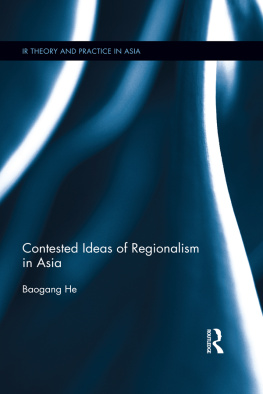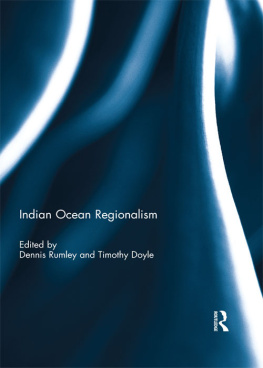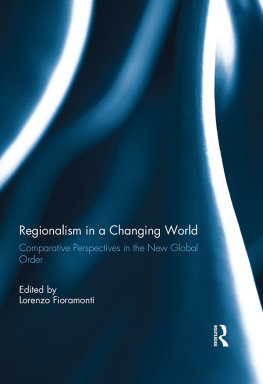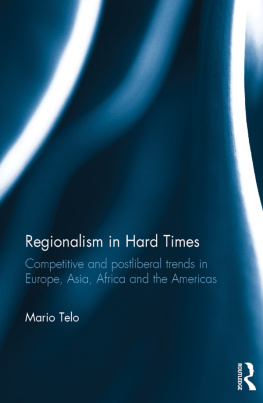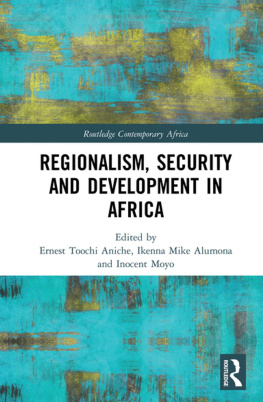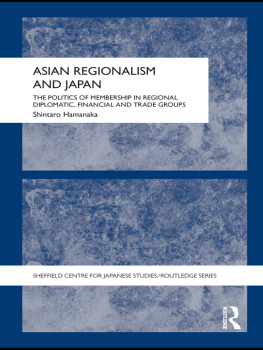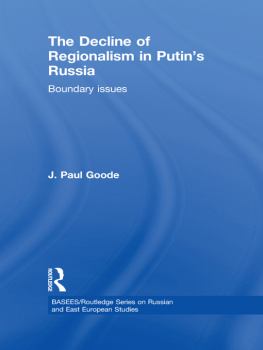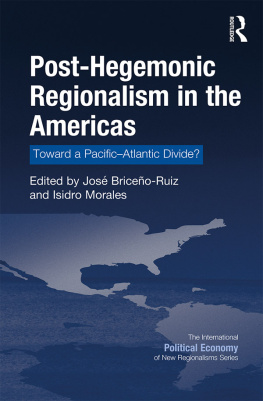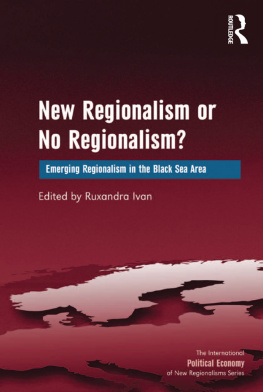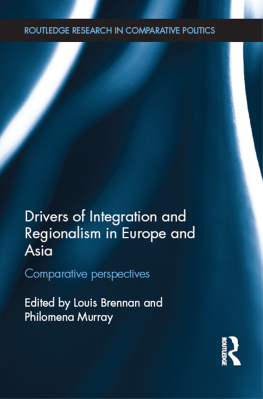Contested Ideas of Regionalism in Asia
Deepening regionalism in Asia demands new leadership. Strong elites who are committed to a supranational identity are a minimum requirement of successful regionalism. Regional leaders are increasingly seen as a new set of leaders in Europe. Currently, Asian regional leaders largely come from the diplomacy community, or trade and economic sectors. Yet further regionalization demands a new type of leadership from civil society and citizens. In this context it is important to cultivate new regional leadership through the development of regional citizenship.
This book examines contested ideas of regionalism in Asia with a particular focus on two competing ideas of Pan-Asianism and Asia-Pacific regionalism. It identifies a new trend and contestation, the fundamental shift from a civilization understanding of regionalism to a technocratic and functional understanding of regionalism in the form of regulatory regionalism. It also examines the other contested imaginations of regionalism in Asia including elitist versus participa-tory approaches to regionalism, and democracy-centric versus nationalism-centric approaches to regionalism.
Baogang He is Alfred Deakin Professor and Chair in International Relations, Deakin University, Australia; and Head of Public Policy and Global Affairs at Nanyang Technological University, Singapore.
IR Theory and Practice in Asia
Series Editors: Yong Soo Eun, Kosuke Shimizu and Ja Ian Chong
This series will publish philosophical, theoretical, methodological and empirical work by prominent scholars, as well as that of emerging scholars, concerned with IR theory and practice in the context of Asia. It will engage with a wide range of issues and questions ranging from meta-theoretical underpinnings of existing Western-oriented IR theories to ways of theorising Asian histories and cultures.
Contested Ideas of Regionalism in Asia
Baogang He
First published 2017
by Routledge
2 Park Square, Milton Park, Abingdon, Oxon OX14 4RN
and by Routledge
711 Third Avenue, New York, NY 10017
Routledge is an imprint of the Taylor & Francis Group, an informa business
2017 Baogang He
The right of the Baogang He to be identified as author of this work has been asserted by him in accordance with sections 77 and 78 of the Copyright, Designs and Patents Act 1988.
All rights reserved. No part of this book may be reprinted or reproduced or utilised in any form or by any electronic, mechanical, or other means, now known or hereafter invented, including photocopying and recording, or in any information storage or retrieval system, without permission in writing from the publishers.
Trademark notice: Product or corporate names may be trademarks or registered trademarks, and are used only for identification and explanation without intent to infringe.
British Library Cataloguing in Publication Data
A catalogue record for this book is available from the British Library
Library of Congress Cataloging-in-Publication Data
Names: He, Baogang, 1957 author.
Title: Contested ideas of regionalism in Asia / by Baogang He.
Description: New York : Routledge, 2017. | Series: Politics in Asia
series | Includes bibliographical references and index.
Identifiers: LCCN 2016020487 | ISBN 9781138651678
(hardback) | ISBN 9781315624655 (ebook)
Subjects: LCSH: RegionalismAsia. | Regionalism (International
organization)Asia. | Asian cooperation. | AsiaForeign
relations21st century.
Classification: LCC JZ5333 .H4 2017 | DDC 320.54095dc23
LC record available at https://lccn.loc.gov/2016020487
ISBN: 978-1-138-65167-8 (hbk)
ISBN: 978-1-315-62465-5 (ebk)
Typeset in Galliard
by Apex CoVantage, LLC
Contents
I would like to thank Amitav Acharya, Kanishka Jayasuriya, John Ravenhill, Philomena Murray, Bill Tow, Takashi Inoguchi, Mark Beeson, David Walker, Anthony Milner, David Hundt, Sally Percival Wood, Tan See Seng, Yong-Soo Eun, Pascal Vennesson and Dylan Loh Ming Hui for their valuable comments and suggestions; Wang Jisi, Jia Qingguo, Yan Xuetong, Zhai Kun, Yu Tiejun, Cui Liru and Li Fujian for their insightful conversations; Kingsley Edney, Matthew Hood, Melissa Conley, Leyang Wang, Shupin Mei, Su Wei, Grace Goh, Wang Wei, and Nguyen Thi Minh Hue for their assistance; and anonymous reports from Australian Journal of Political Science , Australian Journal of International Affairs and Routledge. I would also like to thank the students who chose my courses on regionalism in Beijing and Singapore for their questions, tutorial presentations and discussions. I would like to thanks Simon Bates who invited me to submit my manuscript to Routledge. For the preparation of the final manuscript, I would like to thank Dr. Laura Allison for her updating, editing and referencing. The following institutes are acknowledged for their various forms of assistance: the East Asian Institute at the National University of Singapore where I first wrote the article on the East Asian ideas of regionalism; the School of Humanities and Social Sciences at Nanyang Technological University, Singapore, where I completed this manuscript in 2016; and the School of Political Science and International Studies at Deakin University, where I organized a workshop on Asian ideas of regionalism. Finally, I would like to thank my wife, Suxing; my daughter, Melinda; and my son Andrew, for their daily support.
I would also like to thank the following publishers and journals for permitting me to reproduce some materials. All are revised and updated substantively.
- A Concert of Asian Power and Hybrid Asian Regionalism, Australian Journal of Political Science, Vol. 47, No. 4, pp. 677690, 2012.
- The Awkwardness of Australian Engagement with Asia: The Dilemmas of Australian Idea of Regionalism, Japanese Journal of Political Science , 12(2): 267285, 2011.
- East Asian Ideas of Regionalism: A Normative Critique, Australian Journal of International Affairs , Vol. 58, No. 1, March 2004, pp. 105125.
- Sun Yat-sens Idea of Regionalism and His Legacy, in Lee Lai To and Lee Hock Guan, eds., Sun Yat-sen: Nanyang and the 1911 Revolution, Singapore: Institute of Southeast Studies, 2011, 4460.
- Australian Ideas of Regionalism, in Mark Beeson and Shahar Hameiri, eds., Navigating the New International Disorder: Australia in World Affairs 20112015 , Oxford: Oxford University Press, 2006, 7593.
1
Introduction to the idea of regionalism in Asia
Regionalism is not only an inspirational enterprise in human history, it is also quietly revolutionary. It involves the reorganization of political, economic, cultural and social lives along the lines of an imagined region rather than according to the standard political unit of the nation-state. It is inspiring that for the first time Asia might now achieve a Great Asian Union through regionalization.
Between the eighteenth and twentieth centuries, Western imperialism and colonization offered a range of different unions and created the infrastructure of Asian linkages. It was France that first brought Vietnam, Cambodia and Laos under single administrative control. The Dutch controlled most of the Indonesian territories, and the UK exercised its administrative control over Malaysia and Singapore. However, these were unions by force and by outsiders. In the wake of World War Two, Asians unified themselves to achieve national independence. The unity of Asian peoples culminated in the powerful anti-imperialist movement. The Asian Relations Conference convened by India in 1947 and the Asian-Africa conference in Bandung, Indonesia in 1955, exhibited strong Asian unity in opposition to all forms of colonization and were milestones for Asians to develop the Non-Aligned Movement. Yet this movement lost momentum, and Asia became divided by the newly formed nation-states. In 1962, China and India waged a war over a disputed border. After a honeymoon period between 1962 and 1965, Sino-Indonesian relations deteriorated in the wake of a coup in 1965. Over time there have been many conflicts between Southeast Asian states, and the formation of the Association of Southeast Asian Nations (ASEAN) has successfully stopped the balkanization of the region. Now, moving beyond a focus on national unity, Asians are exploring a much broader, wider and deeper union, a Great Asian Union. This concept, however, continues to be contested and interpreted in different ways.

